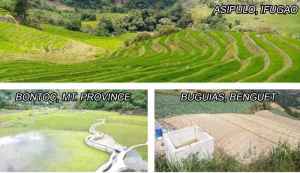NIA-Cordillera sustains food security
The COVID-19 pandemic have complicated food production and the supply chain. Countries in the world including the Philippines are looking ways to improve production to address the enduring effects of the pandemic.
In a recent report by the Food and Agriculture Organization (FAO) specialized agency of the United Nation (UN), stated “major drivers behind the recent changes in food security and nutrition which are increasing in frequency and intensity, include conflicts, climate variability and extremes, and economic slowdowns and downturns – all exacerbated by the underlying causes of poverty and very high and persistent levels of inequality.
“In addition, millions of people around the world suffer from food insecurity and different forms of malnutrition because they cannot afford the cost of healthy diets.’’
Furthermore, the FAO report observes that, while the pandemic has caused major setbacks, there is much to be learned from the vulnerabilities and inequalities it has laid bare.
If taken to heart, these new insights and wisdom can help get the world back on track towards the goal of ending hunger, food insecurity, and malnutrition in all its forms.
In the Philippines- Improving food security by investing in agricultural productivity and infrastructure are just among the priority development objectives.
Food security- increasing the availability of food through increased production, and improving trade and access food. Irrigation is a key in lifting agricultural productivity . And capacitating farmer-irrigators.
In the Cordillera region, here are some NIA-CAR action, compiled by the agency’s Public Information Office.
Primo Agatep/ABN
Provincial
OATHTAKING
July 5, 2025





